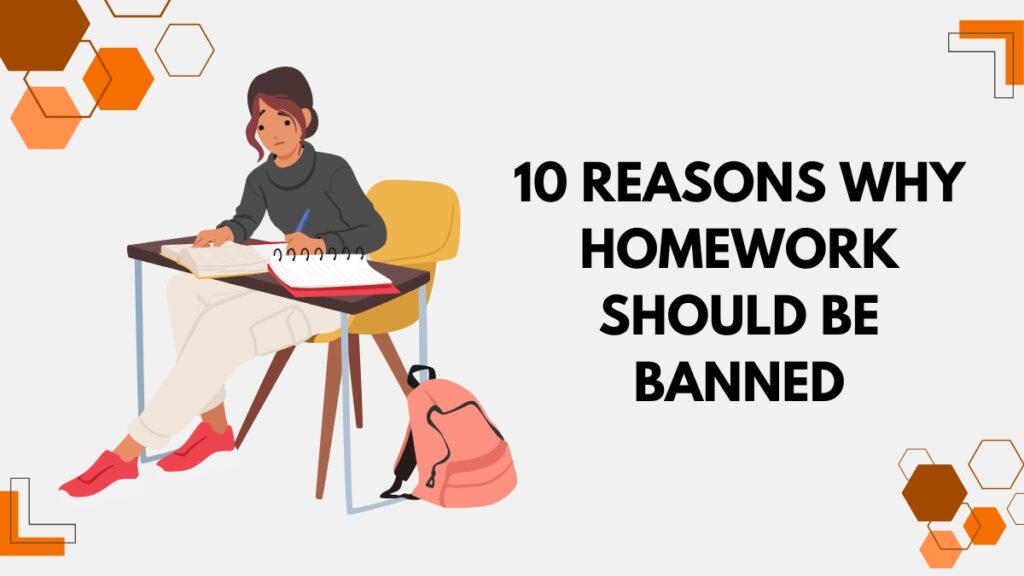Introduction Why homework should be banned
In today’s fast-paced educational environment, students often face mounting pressures to perform well academically. One of the most common sources of this pressure is homework, a practice that many argue Why homework should be banned. While some believe homework is an essential component of the learning process, there is a growing body of evidence and opinion suggesting that its negative impact on students outweighs any potential benefits. From increasing stress levels to encroaching on personal time, homework can have detrimental effects on students’ well-being and overall development. In this article, we will explore the various reasons why homework should be banned and consider the long-term implications for both students and society.
The Impact on Mental Health
One of the most significant arguments against Why homework should be banned is its negative effect on students’ mental health. With the pressure to complete assignments on time, students often experience anxiety, stress, and even depression. According to research, a high volume of homework can lead to burnout, particularly among high school students who are juggling multiple subjects, extracurricular activities, and social responsibilities. The constant pressure to perform can cause feelings of overwhelm, making students feel as though they are never truly “off the clock.” This not only affects their academic performance but also their emotional well-being. For many students, homework represents a continuous cycle of stress that leaves little room for relaxation or personal growth.
Lack of Free Time and Family Interaction
 Why homework should be banned consumes a significant portion of students’ time, often preventing them from engaging in other important activities, such as sports, hobbies, or spending time with family and friends. Childhood is a critical period for developing social skills and building relationships, yet homework takes away valuable opportunities for students to connect with their peers and loved ones. The growing pressure to complete assignments means that children spend less time outdoors or involved in creative pursuits, both of which are vital for mental and physical development. Furthermore, the time spent on homework can create tensions at home, as parents often feel compelled to oversee their child’s academic work. This can lead to frustration and conflict within the family, further exacerbating stress levels for both students and parents.
Why homework should be banned consumes a significant portion of students’ time, often preventing them from engaging in other important activities, such as sports, hobbies, or spending time with family and friends. Childhood is a critical period for developing social skills and building relationships, yet homework takes away valuable opportunities for students to connect with their peers and loved ones. The growing pressure to complete assignments means that children spend less time outdoors or involved in creative pursuits, both of which are vital for mental and physical development. Furthermore, the time spent on homework can create tensions at home, as parents often feel compelled to oversee their child’s academic work. This can lead to frustration and conflict within the family, further exacerbating stress levels for both students and parents.
Diminishing Motivation and Interest in Learning
The primary goal of education is to foster a love of learning, but excessive Why homework should be banned can have the opposite effect. When students are inundated with assignments, they may begin to associate learning with negative emotions such as frustration and exhaustion. This shift in mindset can lead to a decline in motivation, as students start to view schoolwork as a chore rather than an opportunity to expand their knowledge. The monotonous nature of homework, often consisting of repetitive tasks that offer little intellectual challenge, can make students disengaged from the learning process. Rather than encouraging a curiosity-driven approach to education, Why homework should be banned can contribute to a sense of apathy and disinterest in academic subjects.
The Ineffectiveness of Homework in Improving Academic Performance
While Why homework should be banned is traditionally seen as a way to reinforce classroom learning, research has shown that its impact on academic performance is often minimal, especially for younger students. Studies have demonstrated that there is little correlation between the amount of homework students complete and their grades, particularly in elementary and middle school. For high school students, the effectiveness of homework is more apparent, but the benefits tend to plateau after a certain point. When students are overloaded with assignments, they may not have the time or energy to fully engage with the material, leading to superficial learning rather than deep understanding. In many cases, homework simply becomes a task to complete rather than an opportunity to reinforce knowledge.
Homework Disparities and Inequity
Another compelling argument against Why homework should be banned is the inequity it creates among students. Not all students have access to the same resources at home, and some may struggle to complete assignments due to factors such as a lack of a quiet place to study, limited access to technology, or parental support. For students from disadvantaged backgrounds, the additional burden of homework can exacerbate existing educational inequalities. While some students may have tutors or a conducive learning environment, others are left to fend for themselves. This disparity can create a divide in academic achievement, with students from wealthier families often performing better simply because they have access to more resources and support. By eliminating homework, schools would promote a more equitable learning environment, where every student is given the same opportunity to succeed.
Homework as a Barrier to Physical Health
In addition to its mental health implications, homework can also negatively affect students’ physical health. Long hours spent sitting at a desk, staring at a screen or paper, can lead to a range of health issues, including eye strain, headaches, and poor posture. Furthermore, the sedentary nature of homework can contribute to a lack of physical activity, which is essential for children’s overall well-being. With many students already leading busy lives filled with schoolwork and extracurricular activities, there is little time left for physical exercise. The result is an increase in childhood obesity rates and other health concerns. If Why homework should be banned were reduced or eliminated, students would have more time to engage in physical activities that promote healthy development.
Encouraging Independence and Self-Directed Learning
One of the benefits of reducing or eliminating Why homework should be banned is the opportunity to foster greater independence in students. Without the constant pressure of assignments, students would have more time to explore topics of personal interest, engage in independent research, and develop critical thinking skills. This shift would encourage self-directed learning, where students take ownership of their education and learn how to manage their time effectively. Instead of following a prescribed list of tasks, students would have the freedom to pursue their academic interests in a way that suits their learning style. This would not only enhance their understanding of the material but also nurture a lifelong passion for learning.
Educational Systems Around the World and the Homework Debate
Why homework should be banned is a deeply ingrained practice in many educational systems, there are countries that have successfully reduced or eliminated Why homework should be banned without compromising academic success. For example, Finland, which consistently ranks high in global education rankings, has a minimal homework policy. Finnish students spend less time on homework but still perform exceptionally well academically. This suggests that homework may not be as crucial to educational success as it is often believed to be. By focusing on high-quality teaching, individualized learning, and a balanced approach to student life, countries like Finland have shown that it is possible to achieve academic excellence without overburdening students with excessive homework.
Conclusion
The case for banning Why homework should be banned is compelling. The negative impact on students’ mental health, social lives, and physical well-being far outweighs any potential academic benefits. Moreover, the inequities that homework creates among students highlight the need for a more inclusive and fair approach to education. By eliminating or reducing homework, we can foster a healthier, more engaging learning environment that prioritizes the overall development of students. It is time for educational systems to rethink the role of homework and consider alternative methods that promote deeper learning, creativity, and well-being. The ban on homework is not just about reducing workload; it is about creating an educational experience that values students as individuals and supports their growth in all aspects of life.
You Many Also Read: Pedro Vaz Paulo


